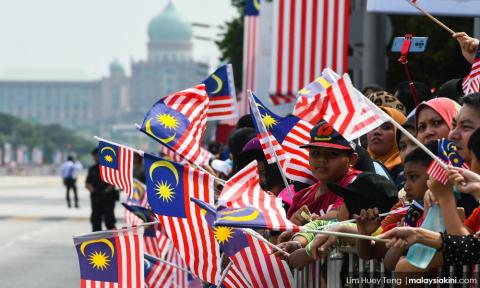
The recent race and religion belittling ahead of the Semenyih polls makes us to self-scrutinise on the fallacy of national unity. It is unfathomable to realise that even after six decades of independent governance, a few unscrupulous and opportunistic politicians are able to blatantly harp on race and religion matters to hoodwink Malaysians for their personal agendas.
To rub salt into the wound, the establishment of race-based parties to serve a particular race and the strengthening of political parties with members from a single race retrogrades Malaysia’s direction towards national unity, while concurrently promoting ethnocentrism.
While the senior citizens recall their memorable multi-racial childhood, more ethnocentric millennials, however, continue to lament over the “unfair” NEP which favours towards the bumiputera in the name of “equal sharing” of national wealth. The uneven socio-economic status and ethnic epistemology are the main cause of discrepancies.
It is imperative for us to understand how ethnocentrism began before we learn to reverse its effects. Ethnocentrism was inculcated during the British and Japanese occupation under a “divide and rule” policy to ease colonial governance. The strategy abhors nationwide integration, perpetuating disunity among the races. According to “Demographic Trends in Peninsular Malaysia 1947-75”, the Malays, Chinese and Indians were separated not only through residence but also by occupation, workplace, language and social organisation.
Looking back at the history, the ethos among national leaders upon independence was the struggle to establish national unity, exacerbated predominantly by poor Malay literacy among the Chinese and Indians. From the same reference stated above, at the time of independence, only three percent of the Chinese population aged ten and over, and four percent of the Indian population in the same group were Malay-literate. Malay literacy among citizens had to be improved if any attempt for national amalgamation was to be proposed. Despite rigorous efforts, even up to 1970, the Malay literacy among Chinese and Indians only increased to 11 percent and 22 percent, respectively (“Educational Statistics of Malaysia, 1938-67”).
It was insufficient to initiate national unity. This situation delineated the need for race-based political parties back at that time. Ever since then, ethnocentrism has deep-rooted itself in the nation’s political fundamentals leading to a race-based power-sharing ideology. We should heed that we span ent inordinate amount of time and resources on delineating our differences rather than celebrating our similarities for the past 60 years.
From a nationalist point of view, the NEP was a well-planned move to prohibit the re-occurrence of the May 13 incident, but from an ethnocentric perspective however, it oppresses the virtuous rights of the non-Malays. A comparative study (“Asian Journal of Social Psychology”, 2002) on national unity between Singaporeans and Malaysians found that Singaporeans tend to identify themselves in terms of nationality, whereas Malaysians will identify themselves according to ethnicity.
With deeper analysis, one may decipher that the existing national policies were firmly laid with a noble intention to instill unity while protecting national interest. In order to collectively rise as one egalitarian nation, it is vital for the races to respect each other’s history, interests, needs and views.
Education and awareness on a wider perspective of national unity is critical for instilling tolerance and reduction in chauvinistic feelings between the ethnic groups. Issues pertaining to national importance (national identity, social integration and trans-ethnic imperatives) should be discussed amenably without coercion or threats of riots and insensible protest. Eradication of the ethnocentric mindset is pivotal for the nation to make the next quantum leap towards a knowledge-based globalised nation.
As Cesar Chavez said, “Preservation of one’s own culture does not require contempt or disrespect for other cultures”. - Mkini
No comments:
Post a Comment
Note: Only a member of this blog may post a comment.